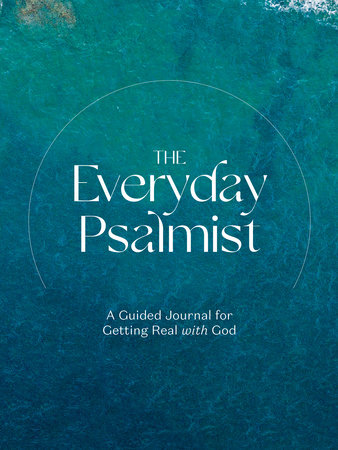Excerpt
The Everyday Psalmist
IntroductionThe next time you hear someone pray aloud in public, pay close attention to the language being used. Not always, but quite often, you’ll hear words and phrases that are different from those we use in daily conversations with our coworkers, or during Friday-night get-togethers with friends, or on Sunday-evening phone calls to relatives. What you’re hearing is what pastor and poet Eugene Peterson called “godtalk,” an impersonal language to talk about or even to God. Godtalk is speech that ends up feeling like insider language, like a secret code consisting of the right words and phrases that only certain people have access to while the rest of us don’t. And occasions like public prayers are notorious for being full of it.
It’s not that there aren’t some words and phrases that naturally find a place in our prayers, but it’s that godtalk sounds, for lack of a better word,
polished. And because you hear it most often spoken by respected voices when it comes to matters of faith and spirituality—people who appear to have everything together—it’s not a stretch to say that godtalk can be a little, if not a lot, intimidating. The end result of such talk is that far too many people consider prayer, and maybe even God, a subject best left to the experts and/or the insiders. And that’s simply not true. Prayer is not a gated community.
The New Testament book of Luke (4:18–19, esv) records Jesus quoting these words:
“The Spirit of the Lord is upon me,
because he has anointed me
to proclaim good news to the poor.
He has sent me to proclaim liberty to the captives
and recovering of sight to the blind,
to set at liberty those who are oppressed,
to proclaim the year of the Lord’s favor.” The poor. The captives. The blind. Those who are oppressed. Think about that both literally and figuratively. God’s good news, which includes this amazing gift known as prayer, is precisely for those who don’t have it all together—which, if we’re honest, is all of us. Prayer is universal access.
Is there some kind of antidote or resistance to this godtalk? Yes, you’re in luck, for we have the gift of the biblical book of Psalms—a collection of 150 poems, songs, and prayers written over hundreds of years by a handful of authors that covers the spectrum of human experiences and emotions— from the happy to the sad to the joyful to the bittersweet to the grateful to the whiny to the angry-shaking-your-fists-at-the-sky to the down-on-hands-and-knees-whispering-please. As Eugene Peterson, the beloved translator of
The Message Bible, explains, one of the first things we realize is that in prayer “anything goes.”
Don’t miss that phrase: “anything goes.”
Although many English translations present otherwise, the language originally used in the Psalms (Hebrew) is a far cry from polished. The psalms in their intended language are raw, earthy, honest, personal, and from time to time just downright awkward. This is language not from people who have their lives all together, but rather from those getting everything in their lives out in the open before God. While we’re at it, that’s a good working definition of prayer—“Getting everything out in the open before God.”
The psalms teach us the language of prayer. If we learn the language, then we can begin to see that God’s interested in every bit of life—nothing’s off limits. Nothing. Remember, “anything goes.” Everything is a context for prayer. And if we learn the language, we’ll realize that the only thing we need to pray our own psalms—to pray our own prayers—is honesty. No polish, no insider language, no secret handshake, no ducks all in a row. Just honesty. If we learn the language, then we’re on our way to following the apostle Paul’s encouragement to “pray without ceasing” (1 Thessalonians 5:17, esv). In other words, living a life of constant prayer.
PLEASE NOTE: Learning to write your own psalms is not intended to be a substitute for reading and praying the biblical psalms, but rather a practice to complement the discipline that has been a part of the lives of Christians for centuries.




